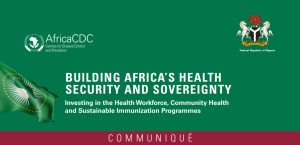Africa CDC’s two-year Public Health Informatics (PHI) Fellowship is expected to commence this year as funding becomes available. The fellowship is one track of the Africa Epidemic Services (AES), an elite workforce program designed to support Member States.
The final draft of the fellowship curriculum was approved during a workshop held from 11 to 14 June 2024, in Addis Ababa at Africa CDC Headquarters. The workshop saw participation from over 45 individuals, including representatives from member states, the Technical Advisory Group, and partners such as HELINA (Health Informatics in Africa), US-CDC, USAID, GIZ, and academics.
“There is a huge gap in informatics training,” said Dr. Bonheur Dounebaine, Senior Technical Officer for Public Workforce at Africa CDC. “This is the first continental program that seeks to address that,” he added.
The Africa Epidemic Services is a flagship project within Africa CDC’s Digital Transformation Strategy and addresses programmatic goals set within the 2020-2025 Framework for Workforce Development.
The AES-PHI aims to equip professionals from Africa with public health informatics competencies for the digital age, enabling them to develop, manage, and lead informatics-savvy health organizations and improve population health outcomes in Africa.
The AES-PHI training model adopted by Africa CDC is designed as a two-year applied fellowship program, featuring 80% practical and 20% instructional training. This training will be delivered through in-person and virtual sessions, with practical learning intervals at designated host sites, which include the Ministries of Health and National Public Health Institutes.
The host sites for the field training of the first cohort include the National Public Health Institutes of Morocco, Zambia, and the Democratic Republic of Congo, as well as the Ministries of Health of Kenya and Senegal.
Dr. Dounebaine noted that 15 African fellows will be selected for the first cohort following a call from Africa CDC.
At the end of this applied training, fellows are expected to develop a comprehensive understanding of public health informatics, including core competencies and knowledge in data management, information systems, and digital technologies. They will also be equipped to support the development of strategic directions for public health informatics within organizations and ensure that public health informatics interventions adhere to relevant laws, rules, regulations, and policies. Many partners, including the US CDC, Resolve to Save Lives, GIZ, HELINA, and the University of Washington/PATH, have supported the initial phase of the AES-PHI fellowship. Thanks to these initial investments, the support team has developed a comprehensive curriculum outline.







